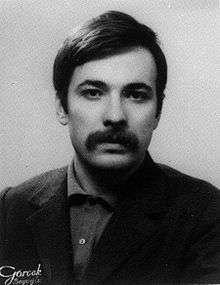Mahir Çayan
| Mahir Çayan | |
|---|---|
 | |
| Born |
March 15, 1946 Samsun, Turkey |
| Died |
March 30, 1972 (aged 26) Kızıldere (Tokat Province), Turkey |
| Nationality | Turkish |
| Alma mater | Ankara University |
| Known for | One of the most well-known Turkish communist leaders |
| Political party | People's Liberation Party-Front of Turkey |
| Partner(s) | Gülten Savaşçı (1970-1972) |
| Parent(s) |
Naciye Çayan (mother) Aziz Çayan (father) |
Mahir Çayan (15 March 1946 in Samsun - 30 March 1972, Kızıldere) was a Turkish politician and the leader of People's Liberation Party-Front of Turkey (Turkish: Türkiye Halk Kurtuluş Partisi-Cephesi). He was a Marxist–Leninist revolutionary leader. On 30 March 1972, he was killed by soldiers with nine friends in Kızıldere village.
Biography
Çayan studied in Haydarpaşa high school and at the school of political sciences[1] of Ankara University. He then became a member of Workers Party of Turkey[2] and a leader of youth movement. He initially supported the idea of National Democratic Revolution but later changed this view. He admired Guevarist guerilla groups in Latin America (Tupamaros), and he created a strategy which was called people's revolution and democratic revolution. He and 10 friends with him abducted two NATO technicians, in return for their demand that Deniz Gezmiş and his colleagues should not be exected. They went to an old village house in Kızıldere with the technicians. However, soldiers did not accept their demand and bombed the old house. Only Ertuğrul Kürkçü survived this attack.
On March 30, 1972, in the Kızıldere village, located in the Black Sea region, where Mahir Cayan lived, is besieged by the army the direction of THKP-C. Mahir Cayan and nine companions were surrounded. They refused to surrender and resisted until the last had fallen in combat.[3]
See also
References
- ↑ Sabri Sayari (July 1985). "Generational changes in terrorist movements: The Turkish case" (PDF). Rand Papers. Retrieved 26 December 2014.
- ↑ Sabri Sayari (Winter 1987). "The Terrorist Movement in Turkey: Social Composition and Generational Changes". Conflict Quarterly. Retrieved 21 September 2015.
- ↑ "La Resistencia en Turquía: El DHKP-C". www.lahaine.org. Retrieved 2015-11-27.